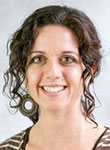Preschoolers can discern good sources of information from bad
By Karene Booker

Young children are not like sponges just soaking up information. They can actively evaluate what people know and go to the "experts" for information they want, reports a Cornell study published in a special issue of Developmental Psychology (Vol. 49:3).
Children, the researchers say, are "natural scientists" who gather and assess evidence from the world around them.
"As adults we rely on experts to help us fill in the gaps in our knowledge -- that is, we appreciate that there is a 'division of cognitive labor' in which different people know different things," said Tamar Kushnir, the Evalyn Edwards Milman Assistant Professor of Child Development and director of the College of Human Ecology's Early Childhood Cognition Laboratory. "Our research suggests that this appreciation for people's differing areas of expertise is based in our early, intuitive 'theory of mind' abilities -- a set of beliefs that begins to form while children are still very young."
To shed light on how children's understanding of cause and effect is influenced by information from other people, 3- and 4-year-old children were shown a short puppet show. One puppet (the "labeler") tried but failed to fix two broken toys, but demonstrated that he knew the names of the tools he used. The other (the "fixer") was able to fix the toys, but didn't know the names of the tools he used. In a series of follow-up questions, children were prompted to choose a puppet to ask for either the names of unfamiliar objects, the functions of unfamiliar tools or for help to fix a few more broken toys.
The researchers found that most of the preschoolers asked the fixer for help with fixing new broken toys. Moreover, they directed their requests selectively and appropriately. They did not ask the fixer to learn object names (for that they asked the labeler) or to learn new tool functions (for that they asked both puppets equally).
In a second experiment, children watched a short video of two adults -- one who fixed toys and one who failed to fix toys. Later, each adult provided explanations for a set of mechanical failures (for example, saying that the toy was broken "because the motor had stopped moving"). Each adult also made claims to know the names of some unfamiliar objects. The children overwhelmingly endorsed the fixer's explanations for why the toy didn't work. Once again, their endorsements were selective; they did not prefer to learn new words from the fixer.
The results suggest that preschoolers can infer what a person might know from watching what they do and use this to choose whom to learn from, the authors said. Across both studies, the children selectively judged the fixers to be reliable sources of information about cause and effect, but not about language (i.e., words) or other common conventions (i.e., tool functions). In other words, the children correctly evaluated the fixer's causal expertise.
"Good educators often struggle to teach a healthy dose of skepticism about unreliable sources, particularly when so much information is readily available electronically," said Kushnir. "Our study and others like it suggest that young children are not entirely credulous. Perhaps there are ways to take advantage of these intuitions as part of early childhood education."
Kushnir co-authored the paper, "'Who can help me fix this toy?' The Distinction Between Causal Knowledge and Word Knowledge Guides Preschoolers' Selective Requests for Information," with graduate student Christopher Vredenburgh and Lauren A. Schneider '11. The study is part of a larger National Science Foundation-funded study on causal learning and was also supported in part by the Leopold Schepp Foundation and the Institute for the Social Sciences at Cornell.
Karene Booker is an extension support specialist in the Department of Human Development.
Media Contact
Get Cornell news delivered right to your inbox.
Subscribe